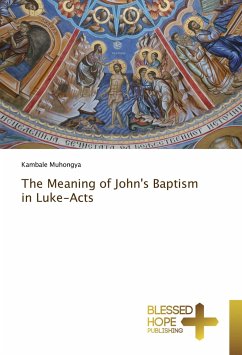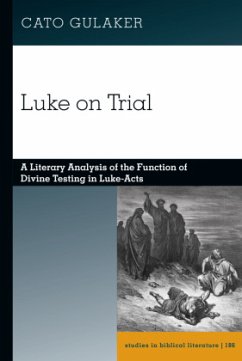
The Meaning of John's Baptism in Luke-Acts
Versandkostenfrei!
Versandfertig in 6-10 Tagen
23,99 €
inkl. MwSt.

PAYBACK Punkte
12 °P sammeln!
Luke declares that John's baptism was "a baptism of repentance for the remission of sins" (Luke 3:3). On the other hand, he calls it a water baptism in contrast to the Spirit baptism of the Mightier One (Luke 3:16). There are three contrasts in Luke 3:16: (1) eg_ (I) versus autos (he), (2) hydati (with water) versus pneumati hagi_ (with the Holy Spirit), and (3) men . . . de (on the one hand . . . on the other hand). These contrasts have led some scholars to disassociate John's baptism from Christian baptism and to connect the latter to the Spirit baptism. However, in Luke 3:3 the genitive met...
Luke declares that John's baptism was "a baptism of repentance for the remission of sins" (Luke 3:3). On the other hand, he calls it a water baptism in contrast to the Spirit baptism of the Mightier One (Luke 3:16). There are three contrasts in Luke 3:16: (1) eg_ (I) versus autos (he), (2) hydati (with water) versus pneumati hagi_ (with the Holy Spirit), and (3) men . . . de (on the one hand . . . on the other hand). These contrasts have led some scholars to disassociate John's baptism from Christian baptism and to connect the latter to the Spirit baptism. However, in Luke 3:3 the genitive metanoias (of repentance) indicates that John's baptism was characterized by repentance. Repentance being the work of the Spirit (John 16:8; 20:22-23), a baptism characterized by repentance cannot be opposed to the Spirit baptism. Moreover, John's baptism dealt with moral impurities while the Old Testament and Qumran ablutions dealt with ritual impurities. The emphasis in the contrasts found inLuke 3:16 is not on the objects (water baptism versus Spirit baptism) but rather on the subjects (John versus the Mightier One). This is evident in the study of men . . . de in the parallel texts.












